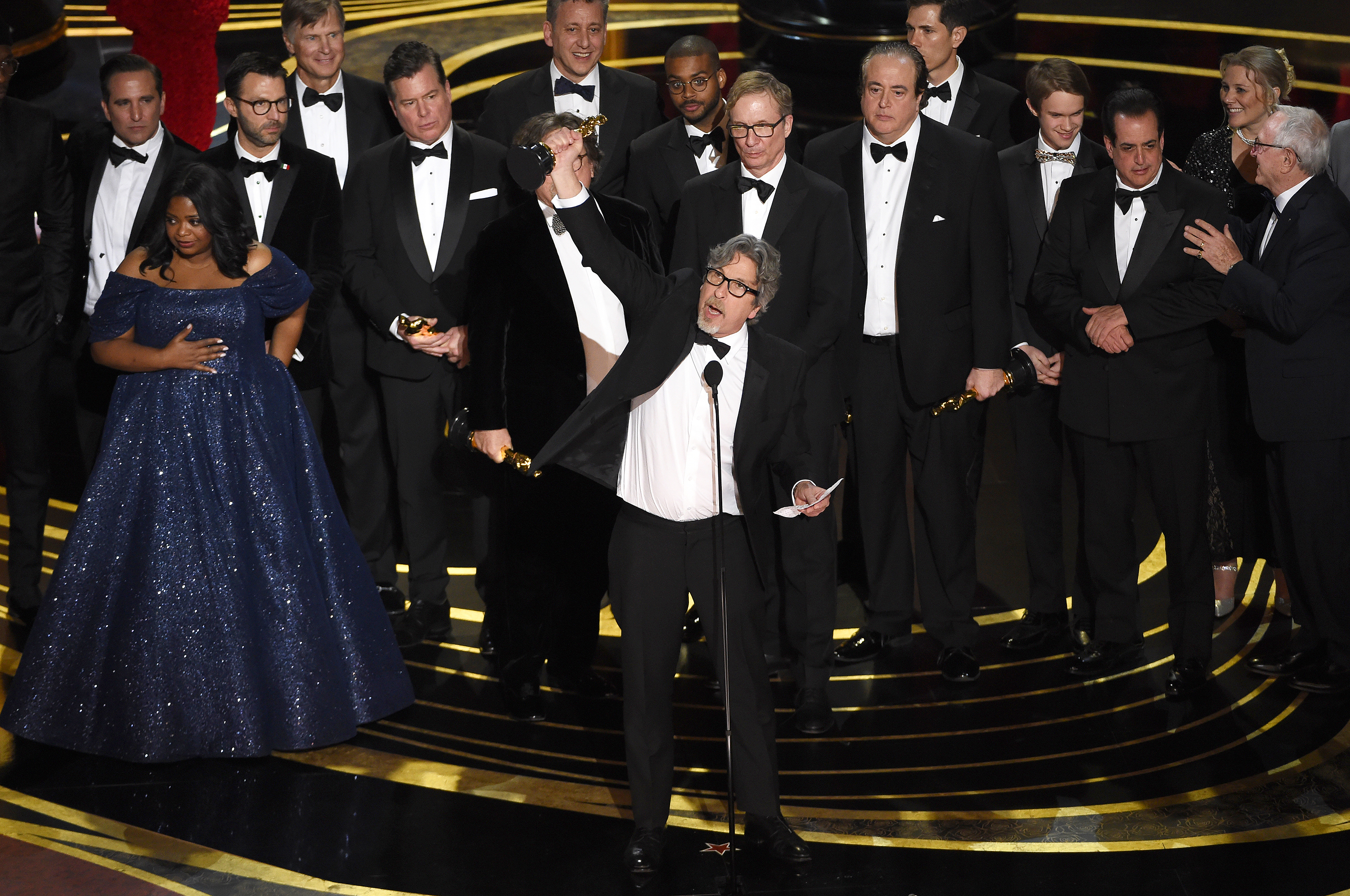How the 2019 Oscars failed to stick the landing
The 2019 Oscars were surprisingly good ... until Green Book won Best Picture


By early evening on Sunday, the 91st Academy Awards were looking to be the greatest Oscars in at least a decade.
Miraculously, the comedy of errors that had led up to the event resulted in many viewers agreeing that the host-less program was just what was needed for "a tight, snappy, fast-moving show." In addition to being mercifully watchable, it seemed as if the Oscars were at last beginning to reflect the tastes of an increasingly diverse body of voters: Bohemian Rhapsody's editing award aside, many of the accolades on Sunday night seemed deserved, if not long overdue. But the optimistic atmosphere was not to last. Green Book, deemed "the worst Best Picture winner in more than a decade" by the Los Angeles Times, became the night's big winner.
How can the Oscars be so good now, while the ceremony's top category remains such a disaster?
The Week
Escape your echo chamber. Get the facts behind the news, plus analysis from multiple perspectives.

Sign up for The Week's Free Newsletters
From our morning news briefing to a weekly Good News Newsletter, get the best of The Week delivered directly to your inbox.
From our morning news briefing to a weekly Good News Newsletter, get the best of The Week delivered directly to your inbox.
The Oscars have faced years of valid criticism over their lack of diversity, prompting a recent conscious attempt to reshape the organization's large body of voters: This year, 49 percent of the incoming members were women, and about 30 percent were minorities, bringing the total Academy voting body to about 31 percent women and 16 percent minorities — that's certainly not perfect, but it is an important step in the right direction. Likewise, while the nominees have tended to be similarly white and male (the creator of 2016's #OscarsSoWhite protest argued recently that "until we are no longer lauding 'firsts' after a 90-year history … #OscarsSoWhite remains relevant"), progress is undeniably being made.
Take, for example, the number of historic achievements notched on Sunday night. Before the show, only one black woman had ever won an Oscar for anything other than acting; two more joined the ranks on Sunday for work on Black Panther's costumes and production design. Spike Lee won for the BlacKkKlansman script, while other directors of color took home awards for the animated short Bao, the animated documentary Period. End of Sentence, and Spider-Man: Into the Spider-Verse. For the first time, foreign-language films were up "in almost every category," in the words of presenter Angela Bassett. Additionally, Roma's Alfonso Cuarón became the fifth Mexican director in six years to win Best Director.
So, it's understandable that Green Book's win felt like two steps back for the baby step taken forward in 2019. New York Times critic Wesley Morris pegged the film as a "racial reconciliation fantasy," yet another example in of a long tradition of Hollywood films about interracial friendships that "treat … black characters as the ideal crowbar for closed white minds and insulated lives." The film, which is based on a true story, has also been slammed for ignoring the black character's version of events, while the scriptwriter has been accused of being Islamophobic. Ironically, Green Book's plot — about a racist Italian-American who gets hired to chauffeur a sophisticated black pianist through the Deep South in the 1960s — is a reverse of Driving Miss Daisy, which beat out Spike Lee's far more impressive Do The Right Thing in 1989. This year, when Green Book beat Lee's "masterpiece" BlacKkKlansman, the director announced to the press room that "every time somebody's driving somebody, I lose!"
Green Book's victory is a symptom of the same illness that has plagued the Best Picture category for decades, resulting in winners ranging from mediocre to terrible, including forgettable films like Argo, The Artist, and The King's Speech. Even as other Oscar categories have matured along with the diversifying voting body, Best Picture has remained bogged down, thanks in part to its unique "ranked choice" voting system that was introduced in 2009, in which the "least disliked" movie typically ends up winning. Art, unlike politics, is not best served by such middle grounds; the approach to picking a Best Picture winner has only proven to hurt the chances of bolder or more challenging films that divide audiences.
A free daily email with the biggest news stories of the day – and the best features from TheWeek.com
As a result, the 91st Academy Awards was both encouraging in its progress and also stymied by its ongoing insistence on pleasing the crowd with a palatable Best Picture winner. While plenty of people are happy with Green Book taking the top award — despite its problems, it is admittedly a competently-made film — in all likelihood, come February 2020, it will be all but forgotten, just like Birdman, or Spotlight.
The Oscars are bigger and more exciting than ever. Never before have so many gripping, boundary-pushing, experimental, beautiful films been in competition. But the biggest award of the night is still waiting to grow up.
Jeva Lange was the executive editor at TheWeek.com. She formerly served as The Week's deputy editor and culture critic. She is also a contributor to Screen Slate, and her writing has appeared in The New York Daily News, The Awl, Vice, and Gothamist, among other publications. Jeva lives in New York City. Follow her on Twitter.
-
 Wilde Cambridge: home-away-from-home in a prime city spot
Wilde Cambridge: home-away-from-home in a prime city spotThe Week Recommends This laid-back aparthotel is the perfect base for a weekend of exploring
-
 The best alcohol-free alternatives for Dry January
The best alcohol-free alternatives for Dry JanuaryThe Week Recommends Whether emerging from a boozy Christmas, or seeking a change in 2026, here are some of the best non-alcoholic beers, wines and spirits to enjoy
-
 A lemon-shaped exoplanet is squeezing what we know about planet formation
A lemon-shaped exoplanet is squeezing what we know about planet formationUnder the radar It may be made from a former star
-
 Walter Isaacson's 'Elon Musk' can 'scarcely contain its subject'
Walter Isaacson's 'Elon Musk' can 'scarcely contain its subject'The latest biography on the elusive tech mogul is causing a stir among critics
-
 Welcome to the new TheWeek.com!
Welcome to the new TheWeek.com!The Explainer Please allow us to reintroduce ourselves
-
 The Oscars finale was a heartless disaster
The Oscars finale was a heartless disasterThe Explainer A calculated attempt at emotional manipulation goes very wrong
-
 Most awkward awards show ever?
Most awkward awards show ever?The Explainer The best, worst, and most shocking moments from a chaotic Golden Globes
-
 The possible silver lining to the Warner Bros. deal
The possible silver lining to the Warner Bros. dealThe Explainer Could what's terrible for theaters be good for creators?
-
 Jeffrey Wright is the new 'narrator voice'
Jeffrey Wright is the new 'narrator voice'The Explainer Move over, Sam Elliott and Morgan Freeman
-
 This week's literary events are the biggest award shows of 2020
This week's literary events are the biggest award shows of 2020feature So long, Oscar. Hello, Booker.
-
 What She Dies Tomorrow can teach us about our unshakable obsession with mortality
What She Dies Tomorrow can teach us about our unshakable obsession with mortalityThe Explainer This film isn't about the pandemic. But it can help viewers confront their fears about death.
